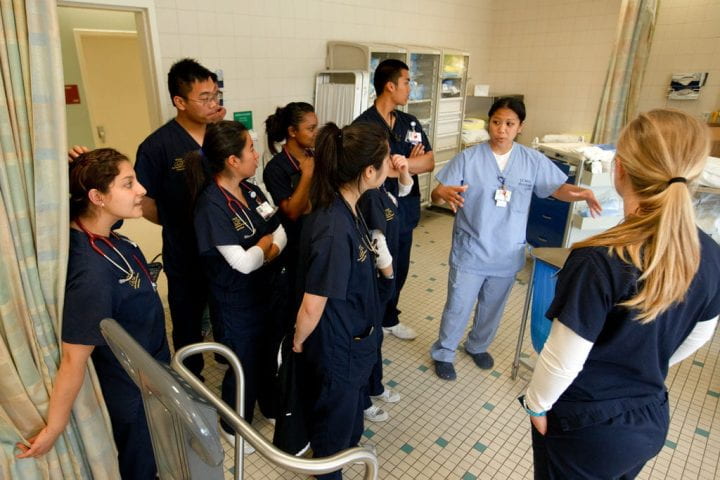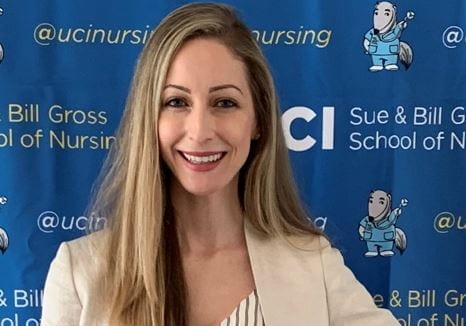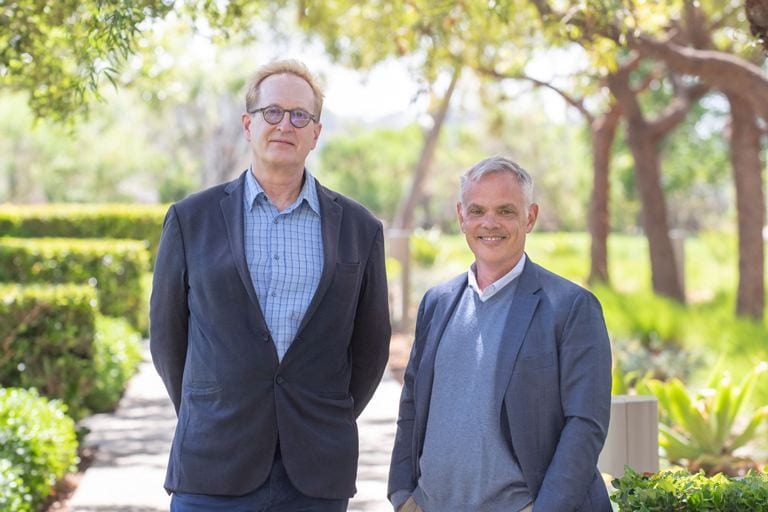Nursing science program readies for future of healthcare
UCI’s growing program supports a future in which they’re full partners in healthcare reform.

UC Irvine’s Program in Nursing Science was established in 2006 to help fill the growing need for highly qualified nurses in California. It may also be playing a role in the transformation of the U.S. healthcare system.
A report issued last year by the Robert Wood Johnson Foundation Initiative on the Future of Nursing and the Institute of Medicine stressed that America’s 3 million nurses – the largest segment of the healthcare workforce – must serve as full partners in driving this healthcare overhaul, a position fully supported by Ellen Olshansky, director and professor of nursing science at UCI.
“In today’s complex healthcare environment, nurses have greater responsibilities to ensure patient health than ever before,” she says. “Nursing has to be a central force behind healthcare reform efforts. We need to be at the table.”
Titled “The Future of Nursing: Leading Change, Advancing Health,” the report offers a blueprint for how nurses can work with physicians and policymakers toward healthcare transformation. For nurses to assume leadership roles – especially in the key areas of prevention and primary care – there must be expansion and improvement in nursing education, it says.
The report recommends that by 2020, 80 percent of registered nurses have bachelor’s degrees (in California, currently only 26 percent do) and that nurses be encouraged to further their education and training by pursuing master’s and doctoral degrees.
Olshansky’s growing program is helping meet these recommendations. Orange County’s first new undergraduate program in 40 years, nursing science at UCI combines course work with hands-on clinical training at UC Irvine Medical Center and state-of-the-art on-campus facilities – such as the Medical Education Simulation Center and the renovated Berk Hall, now the program’s home.
In June, nursing science will graduate its third class, 45 with bachelor’s degrees and six with master’s degrees that will allow them to serve as nurse practitioners.
Most reports on healthcare’s future point to a growing shortage of primary care providers in pediatrics, family medicine and geriatrics. In an HMO-dominated system, these providers often are the bridge to specialized care while working with their patients to advocate healthy lifestyles. More and more, nurse practitioners are filling these vital primary care needs.
In the U.S., nurse practitioners are certified to offer services that primary care physicians do: take health histories and conduct complete physical examinations; diagnose and treat many common acute and chronic problems; interpret laboratory results and X-rays; prescribe and manage medications and other therapies; provide health teaching and supportive counseling with an emphasis on prevention of illness and health maintenance; and refer patients to other health professionals as needed.
Nursing science at UCI offers a graduate program for future nurse practitioners, with specializations in family medicine and geriatrics. Taryn Tanner, 27, is a registered nurse who’s receiving her master’s degree next month and looks forward to becoming a family nurse practitioner with a managed care provider like Kaiser Permanente.
“I entered this program because I value the role of being a nurse and treating and educating patients in a healthcare setting,” she says. “It’s a blending of the heart of nursing and medical science, with a focus on wellness, prevention and education. I’m grateful that UCI’s program has given me the skills and knowledge to fill this important patient care role.”
In addition, Olshansky says, nursing science is close to rolling out a Ph.D. program and is exploring the creation of an undergraduate nursing education program tailored to the distinct healthcare needs of Latino communities. Education tracks are also being developed for integrative health, forensic nursing and a concurrent J.D. program with UCI’s School of Law.
“The growth of nursing science reflects UCI’s and the healthcare community’s commitment to fully utilize the role of nurses to provide compassionate care and improve our nation’s health,” Olshansky says. “Items in the ‘Future of Nursing’ report are starting to be implemented, and I’m excited that our nursing faculty and students will be part of this transformation.”



